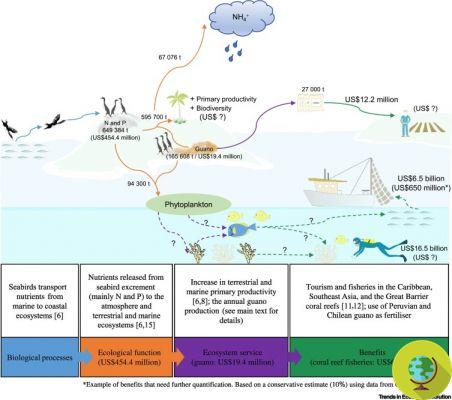Be careful to consider poop only poop: that of seabirds can be worth up to 1 billion euros a year
He is about to end up run over, his mother saves himBe careful to consider poop only poop: that of seabirds can be worth up to 1 billion euros a year. An important figure that researchers at the Federal University of Goiás (Brazil) hope will worry those who continue to threaten these beautiful and fundamental species, whose population is dangerously decreasing.
Fertilizer and a key element for ecosystems, seabird feces, industrially known as guano, are a resource as well as other nutrients they produce through their droppings and therefore, by threatening their survival, we are destroying another immense wealth.
Species such as gulls and pelicans are often overlooked when it comes to conservation and have to "struggle" to get attention. This is why a Brazilian research group calculated the value of their "primary production" by demonstrating that, by not caring about their life, we are (once again) doing harm to ourselves, risking saying goodbye to almost up to 1 billion euros per year.
To prove this figure, the researchers collected data on the global populations of seabirds they produce marketable guano and then they quantified the commercial value through estimates of their market price, arriving at around 400 million euros per year.
“Guano production is an ecosystem service provided by seabirds at no cost to us - explains Marcus V. Cianciaruso, who led the research - I can go to an island, collect the guano and sell it at market price as fertilizer ”.
And where the birds don't produce marketable guano, we still can get other nutrients for free, essential for ecosystems such as coral reefs, where their presence can increase the biomass of reef fish by up to 48%.
To quantify all this, the researchers estimated the value of nitrogen and phosphorus deposited each year in their colonies, calculating the cost of replacing them with inorganic versions and very conservatively hypothesized that 10% of the reef fish stocks depended from the nutrients of seabirds.
"According to the United Nations and the Australian government, the annual economic return of commercial fishing on coral reefs is over 6 billion dollars (more than 5 billion euros per year) - explains Daniel Plazas-Jiménez, co-author of the paper - Therefore, 10% of this value is about 600 million dollars per year (more than 500 million euros, Editor's note) ”.
In total, therefore, the value of the resources that seabirds offer us for free is almost 1 billion euros per year. And, very sadly, much of this value comes from threatened or endangered species.
Killer plastic: ocean litter kills over 90% of seabirds (VIDEO)
"The example of coral reefs is only for a small group of seabirds - continues Plazas-Jiménez - An enormous amount of nutrient deposition occurs in Antarctic ecosystems: penguins contribute half of the nitrogen and phosphorus deposited by birds marine every year. However, 60% of this contribution is made by penguin species with declining populations and these contributions will decrease in the future if no conservation activity is undertaken ”.
That the feces of penguins and seals favored the biodiversity in Antarctica it was also shown by a study by the Vrije Universiteit of Amsterdam that the cold lands of Antarctica are inhospitable but not completely sterile precisely because of the excrement of these precious species.
Penguin and seal poop promotes biodiversity in Antarctica
But nothing, we don't want to understand (or let's pretend we don't understand it). The researchers now hope this paper sheds light on the value of these species on a global scale.
“Seabirds are very important for people - thunders Plazas-Jiménez - Being able to calculate a monetary value of an ecological function made by a particular species is just another tool in the conservation toolbox ”.
Which, by the way, is one particularly low estimate. In fact, only a fraction of the value of seabirds to ecosystems and people is accounted for in this research, which does not include extensive birding and tourism industries around the world, nor the local importance of birds.
For many coastal communities, the direct and indirect benefits of living with them are essential: in some areas, in fact, fishermen follow seabirds to find places to fish. And therefore those birds represent a resource that is difficult to calculate due to its enormity.

©Trends in Ecology & Evolution
"If we start looking at every function that seabirds have and try to monetize it, the value will be much, much higher”Concludes Cianciaruso.
Admitted and not granted that monetization is the only useful tool to understand what damage we are doing to the planet, the numbers speak for themselves: we are destroying ourselves.
The work was published in Trends in Ecology & Evolution.
Sources of reference: ScienceDaily / Trends in Ecology & Evolution
Read also:
- Protected seabird nests destroyed after a wild rodeo at a French beach
- This is how the balloons you throw in the air are killing seabirds


























